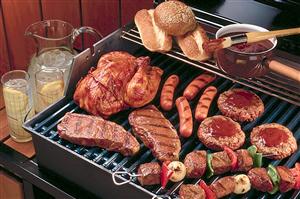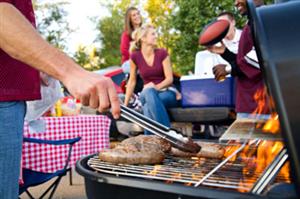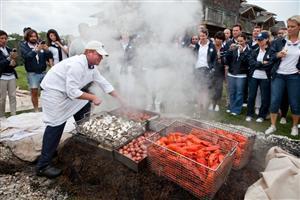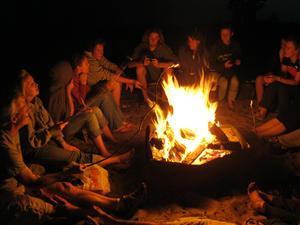
The United States is an extremely expansive country with vast regional variations in climate and geography, culture, ways of speaking, and traditions. From rocky coastlines to arid deserts, deep wooded forests to gentle rolling plains, tropical beaches to the highest peaks summer means something different in each region of the country. But amazingly, despite this broad spectrum of differences, many traditions remain intact throughout the country. Summer barbecues and cook-outs are some of these American cultural constants. With the Fourth of July a recent memory, barbecues, parties, bonfires, and cookouts have been popular ways for Americans to relax and enjoy the charms of summer as they have traditionally been doing for generations. For those of you new to these quintessential American summer past times, here’s a brief guide:

BBQ’s (or Barbecues)
The word barbecue has multiple meanings. First and foremost “barbecuing” using the verb is to slowly cook meat, especially pork, (sometimes vegetables too) over indirect heat from high-smoke fumes that don’t contact the food directly. The component of barbecuing that causes it to differ from basic grilling of meat is the sauce. Barbecue sauces vary region to region, but most commonly are tomato and vinegar based with a variety of spices and rubbed onto the meat to soak up the flavor while cooking. Because of the length of cooking process and its messy tendencies due to the saturation of sauce, barbecuing is almost always done outdoors on a special type of grill that allows for this form of cooking. And from this style of cooking has arise “the barbecue”. A barbecue (as a noun) is a social gathering in which family members and friends gather to mingle and eat various dishes outdoors while the weather is nice and someone (or multiple people) cook the barbecued food. Other common food items seen at barbecues include various forms of salads, such as a green salad, potato salad, pasta salad, corn on the cob, fruit salad, pies, and various other desserts. Because of the change of seasons common in most parts of the United States, taking advantage of the summer weather and therefore the ability to cook one of America’s favorite dishes through barbecuing has become an event intrinsic to a classic American summer.

Cookouts
Cookout are a very similar American pastime during the summer. Cooking on a grill is also the deciding factor in the ability to denominate a gathering as a cookout since the food is grilled and thus cooked outside. Although this sounds very similar to a barbecue (and is considering that the type of gathering and side dishes tend to be very similar) the lack of specific barbecue sauce and special importance placed on the meat as the main part of the meal causes cookouts to tend to be much more casual. Many cookouts are small and impromptu and can happen on beaches, during camping trips, or in a back yard on any given day. Because of their ease of coordination cookouts are commonplace while American’s are taking advantage of being able to spend considerable time outdoors due to the weather.

Bakes
A bake is a New England and coastal version of a barbecue or cookout. A bake usually has the main type of protein being cooking preceding the word bake. For example, a lobster bake, a clam bake, etc. Bakes tend to only be considered a bake rather than a cookout because of the use of seafood. When a seafood is the main dish of the gathering it is usually boiled or baked on an outdoor fire or special cooking unit, like as is done at a lobster bake. A lobster bake would involve outdoor cooking in a large vat of boiling water over a fire or other heating surface. Because of the proximity to the coast and larger of abundance of seafood in comparison to domestic land animals, such as the pork used in barbecuing, bakes tend to be common in New England and other coastal areas.

Bonfires
Bonfires are another classic American summer event. Because of the amount of rural area in the United States with forested land, often times in these rural and wooded areas trees, branches, and other material needs to be cut or falls down and needs to be disposed of. Typically this material is burned. If it is on a person’s private property it is common to pile all this material into a pile and burn it all at once. Often times this becomes a gather as other people add their own natural waste or simply to get together near a warm fire on a summer evening. Although bonfires have old age pagan connotations, today they are simply a way for people to get outdoors during the summer evenings and spend time together. Although food is not necessary for a bonfire, it is very common to see s’mores eaten at bonfires. S’mores are another American classic. The three components of a s’more is a marshmallow roasted over the open fire sandwiched between two graham crackers and chocolate. No summer in the United States is truly American without this delicious treat.
So have you attended one of these events? What is your favorite thing to eat at a barbecue, cookout, or bake? Have you ever heard of s’mores before? We want to know!
